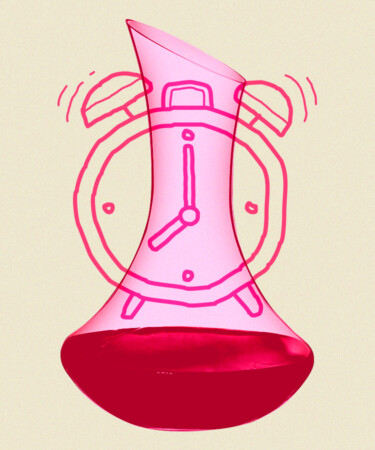For many drinkers, decanting wine may seem like a cumbersome task ending with little reward. However, there are several benefits to the process, and when done correctly, the extra step can improve how the wine will taste.
There are many myths about how and when you should decant wine, some of which we’ve debunked before. But what about time? If you’re going to decant a bottle, what is the appropriate amount of time to do so prior to drinking, and can a wine be decanted for too long? To gain a better understanding, VinePair spoke with Nial Rhys Harris García, sommelier and beverage director at the Conrad Hotel DC.
The main reason for decanting wine is to increase its contact with oxygen, allowing the wine to breathe. This helps amplify aromatics and also impacts the wine’s texture.
Though the type of wine does not determine whether it can be decanted, it plays a big role in how long before drinking the process should ideally take place.
“White wines, in general, should be decanted for shorter periods of time especially because of the loss of ideal drinking temperature,” García says.
However, it’s a different story when it comes to decanting younger red wines. “These wines will benefit from longer periods of oxygen contact as that will permit the wine to reach a more harmonious state,” García says.
The typical range for decanting is often suggested to be 15 to 20 minutes before drinking, and though that duration can be extended there is a point where the process is no longer beneficial. In fact, leaving a wine in a decanter for too long can lead to an inferior drinking experience.
The age of the wine — particularly in the case of reds — is a good indicator of how long it can be decanted. “Younger wines can be decanted for a long time but older wines have a smaller window,” García notes.
Moving from age to texture, highly tannic wines have a longer window and can be poured from bottle to decanter more than an hour before drinking. For Bordeaux blends, Barolo, and Tannat, decanting is one of the best methods to soften the texture in order to make the wine more enjoyable.
Finally, determining the ideal amount of time becomes tricky as the wines age. “With older wines, the vintage, body, and state of the specific bottle affect the amount of minimum and maximum time for decanting,” García says.
